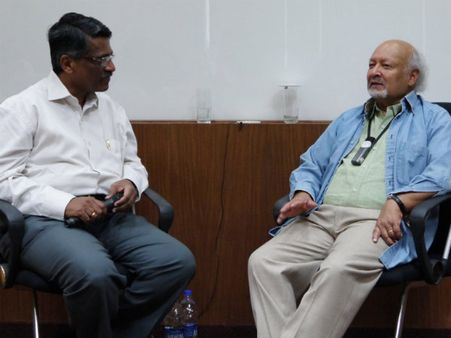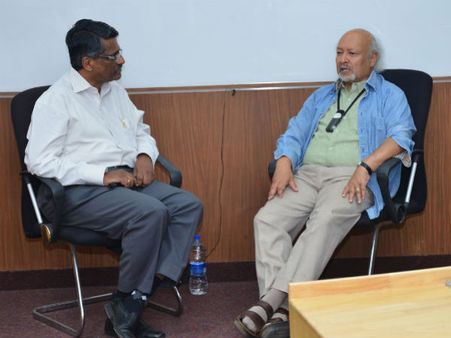India's military should open itself up to private sector research and push for greater indigenisation of products and systems, eminent Stanford University professor and Padma Bhushan recipient Dr Thomas Kailath said today.
Speaking at an interactive session at the Asian School of Business's (ASB) campus in Pallippuram on the outskirts of the city, Dr Kailath noted that in countries like the US and Israel, the defence sector's R&D tie-ups with academia and the private industry have resulted in revolutionary technologies and innovations that have found universal applications.
"India's space sector has done admirably in developing less expensive and world-class technologies indigenously under difficult conditions, but despite decades of research into defence systems, the end products still have a very high proportion of foreign-made components," he said. "A management revolution is needed to make indigenisation work for the military."

Dr Thomas Kailath in conversation with Mr G Vijaya Raghavan at Asian School of Business
India-born Dr Thomas Kailath, the Hitachi America Professor of Engineering, Emeritus, at Stanford University, is one of the world's leading authorities on electronic communications, linear systems, digital signal processing and VLSI systems. In the 1970s he worked with the Indian government as a consultant on troposcatter communications and has been associated with several R&D institutions in the country, notably the Indian Institute of Science in Bangalore.
In conversation with Mr. G. Vijaya Raghavan, Member, Kerala State Planning Board at ASB, he outlined a number of areas that presented interesting challenges and opportunities for innovators and entrepreneurs, including nanotechnology, instrumentation, signal processing algorithms, multiple antenna technology, transportation systems, waste management, bio-engineering and biotechnology and social networking.

Dr Thomas Kailath in conversation with Mr G Vijaya Raghavan at Asian School of Business (2)
Agriculture is another area in India which could do with extensive research and engineering inputs, he said. "The instrumentation techniques and devices used for measurements in agriculture are still crude. There are better methods out there, but researchers need to come up with innovative ideas and look for projects to work on, while the government should increase funding and encourage competitiveness."

Dr Thomas Kailath in conversation with Mr G Vijaya Raghavan at Asian School of Business (3)
Dr Kailath is also a legendary mentor whose lab has seeded a number of successful startup companies in the Silicon Valley in the US. At Stanford his lab has over the years attracted nearly a hundred brilliant doctoral and post-doctoral students many of whom have gone on to found very successful companies. Dr Kailath himself holds a dozen patents and has been a part of four successful technology ventures.
He said the biggest lesson to be learnt from Silicon Valley is that "failure is not a disgrace". "Venture capitalists actually like people who have failed in their first projects, because they would have learnt important lessons," Dr Kailath said.

ASB Director Prof S Rajeev introducing Dr Thomas Kailath (centre) with Mr G Vijayaraghavan1
India-born Dr Thomas Kailath, the Hitachi America Professor of Engineering, Emeritus, at Stanford University, is one of the world's leading authorities on electronic communications, linear systems, digital signal processing and VLSI systems. In the 1970s he worked with the Indian government as a consultant on troposcatter communications and has been associated with several R&D institutions in the country, notably the Indian Institute of Science in Bangalore.
In conversation with Mr. G. Vijaya Raghavan, Member, Kerala State Planning Board at ASB, he outlined a number of areas that presented interesting challenges and opportunities for innovators and entrepreneurs, including nanotechnology, instrumentation, signal processing algorithms, multiple antenna technology, transportation systems, waste management, bio-engineering and biotechnology and social networking.

Dr Thomas Kailath in conversation with Mr G Vijaya Raghavan at Asian School of Business
US institutions like Stanford have managed to turn into cradles of entrepreneurship due to a combination of factors: they attracted the brightest and the best minds, developed direct partnerships with the industry, had liberal policies for patent licensing and gave faculty and students the time to develop innovative ideas and build on them. Universities and institutes of higher education in India can learn from them, Dr Kailath added.
He said education in India should move on from simply learning and memorizing facts. "The role of educators should be to train students to think and instil in them the confidence to follow through with their ideas. This is what institutions in India must do at the fundamental level."



 Click it and Unblock the Notifications
Click it and Unblock the Notifications




























